Summary of Findings
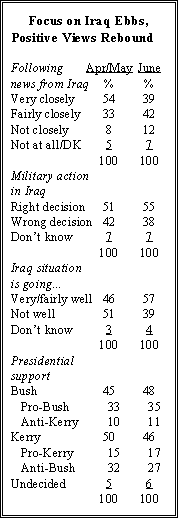
Americans are paying markedly less attention to Iraq than in the last two months. At the same time, their opinions about the war have become more positive. The number of Americans who think the U.S. military effort is going well has jumped from 46% in May to 57%, despite ongoing violence in Iraq and the widening prison abuse scandal. And the percentage of the public who believes it was right to go to war inched up to 55%, from 51% in May.
The new Pew survey indicates that many Americans are becoming less connected to the news about Iraq and possibly more hardened to events there. Just 39% say they are tracking developments in Iraq very closely — down 15 points since April and the lowest level this year. In addition, 35% say that people they know are becoming less emotionally involved with the news from Iraq, a sharp increase from 26% last month.
The poll by the Pew Research Center for the People and the Press, conducted June 3-13 among 1,806 Americans, found lower attention to the war in Iraq even before the death of former President Ronald Reagan dominated the news. Overall, four-in-ten paid very close attention to Reagan’s death and memorial service, which is about the same level as interest in former President Nixon’s death and funeral a decade ago (36% very closely).
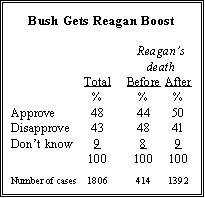
The survey shows that President Bush has improved his political standing over the past month. His overall approval rating increased slightly, from 44% in May to 48%. Notably, all of Bush’s gains occurred after Reagan’s death on June 5. Prior to that, Bush’s approval rating was the same as in May (48% disapprove/44% approve). But during the remainder of the polling period (June 6-13), Bush’s approval rating increased to 50%.
Bush also has gained ground in the presidential race. He currently is in a dead heat with Sen. John Kerry (48% Bush/46% Kerry) in a two-person contest; last month, Bush trailed Kerry by five points. When Ralph Nader is included, Bush leads by a slight margin (46%-42%).
The campaign continues to be dominated by feelings about Bush, but anti-Bush sentiment has subsided slightly. Just over a quarter of voters (27%) say they support Kerry based on their opposition to the president, down from 32% last month. Over the same period, Kerry’s overall horse race support has fallen from 50% to 46%.
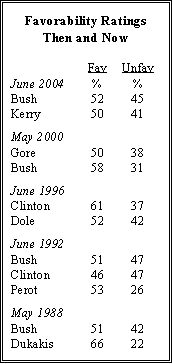
Favorable views of Kerry have slipped since his successful run through the Democratic primaries, as opinions of the presumptive Democratic nominee have grown more partisan. Currently, 50% have a positive impression of the Massachusetts Democrat — down from 58% in February — while negative opinions have increased sharply, from 28% to 41%.
That is in line with Bush’s overall rating (52% favorable/45% unfavorable). Kerry’s ratings also are comparable to those of other recent presidential candidates, both winners and losers. Four years ago, Al Gore received similar ratings. In June 1992, opinions of Bill Clinton were decidedly more negative. Four years earlier, Democratic challenger Michael Dukakis had extremely high favorable ratings (66% in May 1988), but lost the election by a wide margin.
Bush’s favorable ratings are largely driven by positive evaluations of his personality. In an open-ended format, 65% of those who expressed a favorable opinion of Bush cited his personal characteristics — especially honesty, leadership and his religious beliefs. People who have a negative impression of Bush generally mentioned his policies, with nearly a third specifically citing the war in Iraq.
Positive impressions of Kerry are less clearly defined. About half of those who have a favorable view of Kerry (46%) mention his personal traits while 26% cite policies, but no specific policy stances stand out. Unlike Bush, negative opinions of Kerry are driven by his personality, with 19% specifically mentioning his consistency (or lack of it).
The public gives comparably favorable ratings for Congress (56% positive) and the two major political parties. A 54% majority rates the Democratic Party favorably, while 51% express a positive opinion of the Republican Party. But opinions of the military, while overwhelmingly positive, have declined from the high levels recorded in the aftermath of the 9/11 attacks. This is seen particularly in the number who have a very favorable opinion of the military, which has fallen to 48% from 59% in a May 2002 survey conducted by Newsweek.
The survey shows that, with the approach of the June 30 deadline for the U.S. transfer of power in Iraq, the public is divided over whether Iraqis will be able to form an effective government: 41% believe that is possible, while slightly more (45%) say they will not be able to establish an effective government. Yet there is growing optimism that, despite doubts over the transition, U.S. forces can be withdrawn from Iraq in the next two years.
Half the public expects that U.S. troops will have to remain in Iraq for two years or less. In an April CBS News/New York Times survey, just 35% said U.S. forces could be withdrawn in the next two years. Since then, the percentage who say U.S. forces will have to remain in Iraq less than a year has doubled, from 8% to 17%.
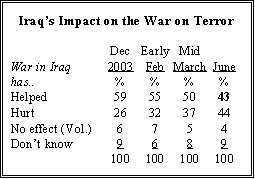
Regarding one important consequence of the war, however, the public has become considerably more negative. Just 43% of Americans say the Iraq war has helped the war on terrorism while about as many (44%) believe it has hurt the war on terrorism. About a year ago, 65% felt the war had helped the war on terrorism and as recently as March, 50% expressed that view. Women, especially white women, have become particularly skeptical that the war is helping the war on terrorism. In March, a solid majority of white women (54%) said the war in Iraq helped the war on terrorism; that number has dropped to 43%.
Bush Job Approval
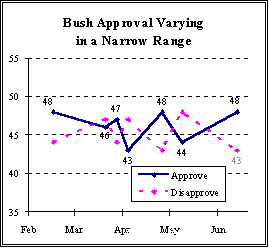
President Bush’s job approval rating reached its 2004 peak, at 58%, in early January following the capture of Saddam Hussein. Since February, Bush’s ratings have fluctuated between 43% and 48%. Bush’s current standing (48% approve, 43% disapprove) is somewhat higher than the 43% rating he received in early April, after the eruption of violence in and around Fallujah, and his 44% mark in May, following revelations of prisoner abuse by U.S. troops at Abu Ghraib.
Evaluations of the president’s performance on the economy, Iraq, and terrorism show a similar pattern. Approval of Bush’s handling of the situation in Iraq has changed the most over the past six months, falling from 59% in January to 42% today. However, public views have stabilized, in the low 40% range, over the past few months.
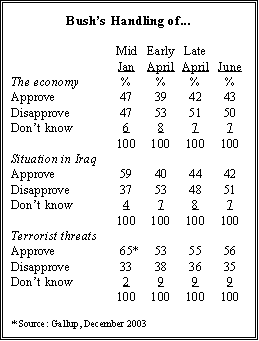
Currently, 43% approve of the president’s job in handling the economy, up slightly from 39% two months ago. Clearly, terrorism remains the president’s strongest issue. A solid majority (56%) approves of the job the president has done in this area. This is well below the president’s ratings on this issue throughout 2002 and 2003. But his ratings here also have been steady since April.
Issues Matter
George W. Bush’s 48% to 46% lead over Kerry in the two-way test ballot reflects a modest improvement from a month ago, when Kerry held a 50% to 45% advantage. This overall shift reflects a substantial change among women who favored Kerry by a 53% to 41% margin in May, and are split evenly (47% Kerry, 46% Bush) today. Men, by comparison, favor Bush by a 50% to 46% margin in both surveys.
In evaluating their electoral preferences, voters say the candidates’ issue positions are the most important considerations. Pluralities of both Bush and Kerry supporters (49% and 45%, respectively) mention their candidate’s stand on issues as what they like most about him. Similarly, 52% of Bush supporters say Kerry’s issue stance is what they like least about him, and 41% of Kerry backers say the same about Bush.
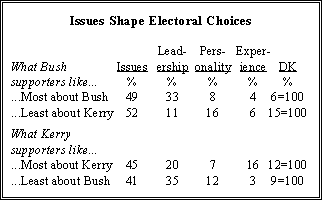
While issues predominate, Bush’s perceived leadership ability is clearly important to many on both sides. Roughly a third of both Bush and Kerry backers cite the president’s leadership as what they like most — or least — about him. Fewer cite leadership as either Kerry’s best or worst trait.
Top Issues: Economy, Iraq
The economy tops the list of issues voters most want to hear the presidential candidates talk about. In an open-ended format, nearly three-in-ten (29%) volunteer the economy as the issue they most want the candidates to discuss, while 20% cite Iraq, and 7% say the candidates need to discuss terrorism. Domestic issues such as the job situation (6%), health care (5%), education (4%) and gas prices (4%) round out the list of top voter concerns.
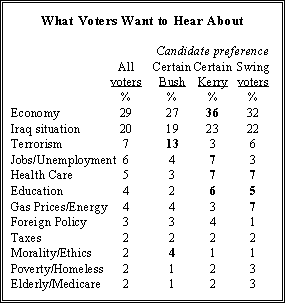
The economy is of greater concern to Kerry supporters than to those who back Bush. More than a third of Kerry supporters (36%) cite the economy as the issue they most want discussed, compared with 27% of Bush voters. Swing voters — those who are undecided or who express a preference but say they still might change their minds — fall in between. About a third of swing voters (32%) want to hear the economy discussed.
There are fewer differences over Iraq, but terrorism is much more important to Bush supporters than to those who back Kerry (13% vs. 3%). Jobs, health care, and education are listed more frequently by Kerry’s backers. Swing voters also express more interest in hearing the candidates discuss health care and education than do Bush supporters. And swing voters are about twice as likely as committed supporters of either candidate to say gas prices should be the main topic of discussion.
Favorability Ratings
Bush and Kerry receive similar favorability ratings from the public. Roughly half rank each candidate favorably (52% for Bush, 50% for Kerry) with slightly fewer rating each of the candidates unfavorably (45% for Bush, 41% for Kerry).
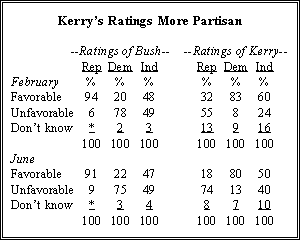
The public’s ratings of the president are almost identical to measures taken in February, and reflect strong partisan divisions. By about ten-to-one (91% to 9%) Republicans have a favorable view of the president, while Democrats feel unfavorably by more than three-to-one (75% to 22%), and independents are divided (47% favorable, 49% unfavorable).
Views of Kerry have changed markedly from a high point in February when Kerry was in the process of wrapping up the Democratic nomination. At that time, favorable ratings of the Massachusetts senator outnumbered unfavorable by two-to-one (58% to 28%). Today, the margin is much narrower (50% favorable, 41% unfavorable), reflecting significant shifts among both Republicans and independents. Four months ago, just over half of Republicans (55%) rated Kerry unfavorably; today, that figure is 74%. Negative impressions of Kerry have grown among independents as well. Today 40% of independents rate Kerry unfavorably, up from 24% in February.
When compared with previous campaigns, Kerry’s favorability rating is identical to Gore’s in May 2000; Bush’s 52% mark is somewhat lower than his 58% rating at that time. In June 1996, 52% expressed a favorable impression of Bob Dole, well below the 61% who felt favorably toward Bill Clinton at the time.
In general, favorability ratings at this stage of the campaign are uncertain predictors of electoral success. In 1992 George H. W. Bush had higher favorable ratings than Bill Clinton, who went on to defeat Bush in November. In 1988, fully 66% said they had a favorable impression of Michael Dukakis, placing him far above George Bush Sr.’s 51% favorability rating.
Kerry’s Image Vague
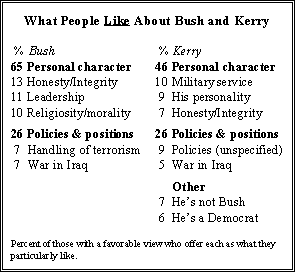
Supporters of both candidates say their preferences are driven primarily by their issue positions. But in explaining why they feel favorably about Bush or Kerry, most cite their personal characteristics.
Those who feel favorably toward Bush most frequently cite his honesty, leadership, and his morality and religious beliefs. By contrast, those who feel favorably toward Kerry are vague in explaining this opinion. One-in-ten cite his military service as what they like most, but many others simply say they like his personality or agree with his position on issues, without giving any specifics.
Those who have an unfavorable opinion of Bush cite his positions on issues, with a third citing the war in Iraq as what they dislike most. Beyond Iraq, Bush is faulted for his handling of the economy, foreign policy, jobs, oil prices, and taxes.
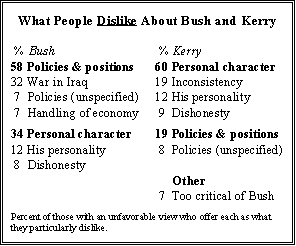
Of the minority who cite Bush’s personal character as what they dislike most, references are to his personality in general — many offering “arrogance” as his greatest fault — or his perceived dishonesty.
By comparison, very few point to policy issues in describing what they dislike most about John Kerry. Instead, the focus is on his personal character, particularly his perceived inconsistency. One-in-five who have an unfavorable view of Kerry say he’s “wishy-washy,” a “flip-flopper,”and someone who “can’t make up his mind.”Another 9% say his dishonesty is what they like least about him, and 7% say they are most bothered by what they see as an overly critical campaign against the president.
Few Differences in the Battleground
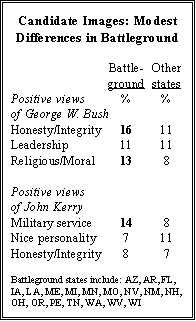
Overall favorability ratings of the candidates in the electoral battleground states are about the same as they are nationwide (55% for Bush, 50% for Kerry). Despite intensive campaign advertising in these states, people describe what they like and dislike about the candidates in basically the same terms as do people elsewhere, with only small differences in how people explain their favorable views.
People with favorable views of Bush in battleground states are more likely than those elsewhere to cite his honesty, integrity, and his religious and moral standing as what they like most, but are no more likely to refer to his leadership or any specific policy positions. Similarly, people with favorable views of Kerry in battleground states are slightly more likely than those elsewhere to say they most like his military record, but are no more apt to mention his leadership or policy issues.
Despite heavy negative advertising, people in battleground states are no more likely than those elsewhere to say Kerry is a flip-flopper or to even mention that he is too liberal. And those with unfavorable views of Bush describe their opinion in the same terms whether in battleground states or not.
Nader Unpopular
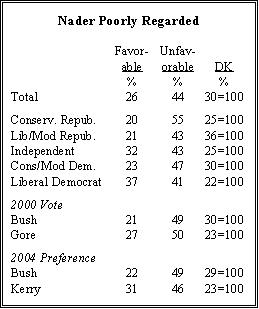
There is little doubt that Ralph Nader’s role as “spoiler” in the 2000 election had a negative impact on his reputation. Currently, 44% view Nader unfavorably, while just 26% view him favorably. In a Gallup survey conducted exactly four years ago, more felt favorably toward the Green Party nominee (36%) than unfavorably (22%). Looking back to the 2000 vote, people who voted for Al Gore view Nader unfavorably by a 50% to 27% margin. This is only slightly better than among Bush supporters (49% unfavorable, 21% favorable).
While Ralph Nader is viewed somewhat more positively by the left than by the right, even among liberals Democrats, as many give unfavorable marks to Nader (41%) as favorable marks (37%).
Who Will Win?
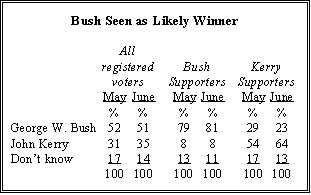
Roughly half of voters (51%) think Bush is most likely to win, while 35% say Kerry. Despite some increase in confidence, Kerry backers continue to express far less optimism about their candidate’s chances than do Bush backers. By an 81% to 8% margin, voters who support George W. Bush think he, not Kerry, will prevail in November. By comparison, 64% of Kerry backers pick their candidate as the likely victor, while 23% think Bush will end up winning. However, this represents a modest increase from last month, when 54% picked Kerry to win.
Opinions About War Mostly Steady
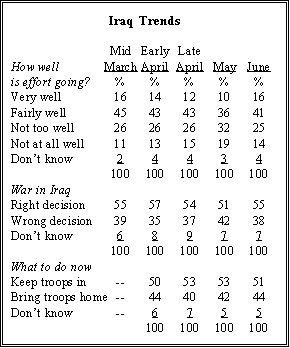
The public’s perceptions of the U.S. military effort Iraq have improved significantly since their low point in May. Despite the rebound, however, they are slightly lower than in mid-March, before the outbreak of anti-American violence in Fallujah and elsewhere, and prior to the prison abuse scandal. Roughly six-in-ten (57%) say things in Iraq are going very or fairly well. In mid-March, 61% had a positive view of the situation in Iraq.
Support for the war has remained fairly consistent for the past three months. A 55% majority believes the United States made the right decision in going to war, up slightly from 51% in May, when the public was first learning about the prison abuse scandal.
Similarly, opinion on whether to retain forces in Iraq, or withdraw them as soon as possible, has been stable through the recent tumultuous period in Iraq. A narrow majority of Americans (51%) believe the United States should keep its forces in Iraq until a stable government is formed there, while 44% favor withdrawing U.S. forces as soon as possible.
Perceptions and attitudes toward the situation in Iraq remain colored by partisanship. Republicans continue to overwhelmingly support the war, and 71% support keeping U.S. forces in Iraq until a stable government is formed. Democrats oppose the war by roughly two-to-one (61%-32%), and a solid majority (60%) favors withdrawing the troops as quickly as possible. Democratic support for a troop withdrawal has risen modestly (from 54%) since May.
A narrow majority of independents (53%) believe the war was the right decision, up slightly from May (48%). Half of independents say U.S. forces should remain in Iraq until a stable government is formed, while 46% think they should be brought home as soon as possible. Those opinions are unchanged since May.
And the public continues to reject comparisons between the conflict in Iraq and the war in Vietnam three decades ago. Only about three-in-ten (29%) believe that Iraq will turn out to be “another Vietnam,” while 55% think the U.S. will accomplish its goals. In late April, Americans dismissed this comparison by a similar margin (25% another Vietnam/54% accomplish goals).
Cautious on the Transition

The survey shows that most Americans are at least somewhat aware of the planned transfer of power to Iraqi officials on June 30. Roughly four-in-ten (42%) say they have heard a lot about the transition, while about the same number (40%) have heard a little. Older and well-educated Americans show higher levels of awareness than younger and less-educated people. Overall awareness of the June 30 transfer is comparable to interest in former White House aide Richard Clarke’s criticisms of the Bush administration’s pre-9/11 anti-terrorism efforts in March (42% a lot/47% a little).
Americans are divided over whether the Iraqis will be able to form a stable government after the transition — 41% say they will be able to achieve this, while 45% disagree. And those who have heard a lot about the June 30 transfer of power are no more or less optimistic than are people who are less aware of the issue: 42% of each group think that the Iraqis will be able to establish an effective government after the U.S. transfers power.
Yet people who say they have heard a lot about the transfer of power are much more supportive than others of keeping U.S. forces in Iraq until a stable government is formed. Two-thirds of this group (67%) believes the United States should retain its forces in Iraq until a stable government is created, compared with just 43% of those who have heard a little about the planned power transfer.
For the most part, Americans who are closely following the June 30 transfer of power also do not believe the U.S. will be able to leave Iraq any time soon. Just 12% of those who have heard a lot about the power transfer believe U.S. forces will be home in less than a year; that compares with 20% of those who have heard a little about the transition and 24% of those who have heard nothing about it.
Terrorism Worries Up
A quarter of Americans say they are very worried there will soon be another terrorist attack in the U.S., up somewhat from 20% in mid-March. Concern over possible terrorism has fluctuated over the past year, but this is the highest level measured since February 2003 (34%).
The public’s evaluations of how well the government is doing in defending the country against terrorism have changed little compared with two years ago. Six-in-ten say the government is doing an excellent (14%) or good job (46%) in defending against terrorism, which is similar to August 2002 ( 57%). Republicans are strongly positive about the government’s anti-terrorism efforts: 77% rate the performance as excellent or good compared with about half of independents (53%) and Democrats (49%).
Gas Prices Lead News Index
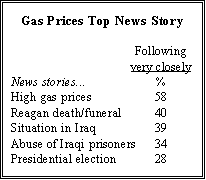
News about the high price of gasoline drew the highest level of public interest in June. Nearly six-in-ten Americans (58%) paid very close attention to this story. That is up sharply since late April (46%), but the same level of attentiveness as in early April (58%).
There is broad interest in rising gas prices, but minorities, in particular, are following this story very closely. About seven-in-ten African Americans (69%) and nearly as many Hispanics say they are tracking higher gas prices very closely. That compares with 56% of whites.
Four-in-ten Americans followed reports on the death and memorial services of former President Reagan very closely. Half of Republicans followed the Reagan coverage very closely, compared with 36% of Democrats. There was an equally large partisan gap in attention to the 1994 funeral of former President Richard Nixon.
As noted, interest in news about the current situation in Iraq has declined sharply since April. Attention to this story has fallen across the demographic spectrum. Republicans remain somewhat more interested in developments in Iraq than Democrats or independents; 44% of Republicans say they are tracking news from Iraq very closely, compared with 38% of Democrats and the same number of independents.
About a third of Americans (34%) say they very closely followed news of the abuse of Iraqi prisoners by U.S. soldiers in Iraq. This is down slightly from 41% in a Gallup poll taken in early May. There are only modest partisan differences in interest in this story, but those who disapprove of President Bush’s job performance are more likely than those who approve of the president to follow reports on the prison scandal very closely (42% vs. 30%).
Public interest in news about candidates for the 2004 presidential election has declined a bit since earlier this year. Fewer than three-in-ten (28%) say they are following campaign news very closely, down from 31% in April and 35% in mid-March. Nonetheless, interest is higher now than at a similar stage in the presidential campaigns of four and eight years ago; in June 2000, 23% were following the election very closely and about the same number did so in July 1996 (22%).